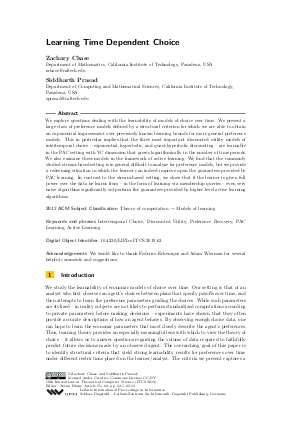Learning Time Dependent Choice
Authors Zachary Chase, Siddharth Prasad
-
Part of:
Volume:
10th Innovations in Theoretical Computer Science Conference (ITCS 2019)
Part of: Series: Leibniz International Proceedings in Informatics (LIPIcs)
Part of: Conference: Innovations in Theoretical Computer Science Conference (ITCS) - License:
 Creative Commons Attribution 3.0 Unported license
Creative Commons Attribution 3.0 Unported license
- Publication Date: 2019-01-08
File

PDF
LIPIcs.ITCS.2019.62.pdf
- Filesize: 480 kB
- 19 pages
Document Identifiers
Subject Classification
ACM Subject Classification
- Theory of computation → Models of learning
Keywords
- Intertemporal Choice
- Discounted Utility
- Preference Recovery
- PAC Learning
- Active Learning
Metrics
- Access Statistics
-
Total Accesses (updated on a weekly basis)
0Document
0Metadata
Abstract
We explore questions dealing with the learnability of models of choice over time. We present a large class of preference models defined by a structural criterion for which we are able to obtain an exponential improvement over previously known learning bounds for more general preference models. This in particular implies that the three most important discounted utility models of intertemporal choice - exponential, hyperbolic, and quasi-hyperbolic discounting - are learnable in the PAC setting with VC dimension that grows logarithmically in the number of time periods. We also examine these models in the framework of active learning. We find that the commonly studied stream-based setting is in general difficult to analyze for preference models, but we provide a redeeming situation in which the learner can indeed improve upon the guarantees provided by PAC learning. In contrast to the stream-based setting, we show that if the learner is given full power over the data he learns from - in the form of learning via membership queries - even very naive algorithms significantly outperform the guarantees provided by higher level active learning algorithms.
Cite As Get BibTex
Zachary Chase and Siddharth Prasad. Learning Time Dependent Choice. In 10th Innovations in Theoretical Computer Science Conference (ITCS 2019). Leibniz International Proceedings in Informatics (LIPIcs), Volume 124, pp. 62:1-62:19, Schloss Dagstuhl – Leibniz-Zentrum für Informatik (2019)
https://doi.org/10.4230/LIPIcs.ITCS.2019.62
BibTex
@InProceedings{chase_et_al:LIPIcs.ITCS.2019.62,
author = {Chase, Zachary and Prasad, Siddharth},
title = {{Learning Time Dependent Choice}},
booktitle = {10th Innovations in Theoretical Computer Science Conference (ITCS 2019)},
pages = {62:1--62:19},
series = {Leibniz International Proceedings in Informatics (LIPIcs)},
ISBN = {978-3-95977-095-8},
ISSN = {1868-8969},
year = {2019},
volume = {124},
editor = {Blum, Avrim},
publisher = {Schloss Dagstuhl -- Leibniz-Zentrum f{\"u}r Informatik},
address = {Dagstuhl, Germany},
URL = {https://drops.dagstuhl.de/entities/document/10.4230/LIPIcs.ITCS.2019.62},
URN = {urn:nbn:de:0030-drops-101550},
doi = {10.4230/LIPIcs.ITCS.2019.62},
annote = {Keywords: Intertemporal Choice, Discounted Utility, Preference Recovery, PAC Learning, Active Learning}
}
Author Details
References
-
M.F. Balcan, A. Daniely, R. Mehta, R. Urner, and V. V. Vazirani. Learning economic parameters from revealed preferences. In International Conference on Web and Internet Economics, pages 338-353. Springer, Cham, 2014.

-
P. Basu and F. Echenique. Learnability and Models of Decision Making under Uncertainty. In Proceedings of the 2018 ACM Conference on Economics and Computation, pages 53-53. ACM, 2018.

-
E. Beigman and R. Vohra. Learning from revealed preference. In Proceedings of the 7th ACM Conference on Electronic Commerce, pages 36-42. ACM, 2006.

-
G. S. Berns, D. Laibson, and G. Loewenstein. Intertemporal choice - toward an integrative framework. Trends in cognitive sciences, 11(11):482-488, 2006.

-
L. Blume, A. Brandenburger, and E. Dekel. Lexicographic probabilities and choice under uncertainty. Econometrica: Journal of the Econometric Society, pages 61-79, 1991.

-
A. Blumer, A. Ehrenfeucht, D. Haussler, and M. K. Warmuth. Learnability and the Vapnik-Chervonenkis dimension. Journal of the ACM (JACM), 36(4):929-965, 1989.

-
C. F. Chabris, D. I. Laibson, and J. P. Schuldt. Intertemporal choice. Behavioural and Experimental Economics, pages 168-177, 2010.

-
C. P. Chambers and F. Echenique. On multiple discount rates. Econometrica, 86(4):1325-1346, 2018.

-
D. Cohn, L. Atlas, and R. Ladner. Improving generalization with active learning. Machine learning, 15(2):201-221, 1994.

-
S. Dasgupta. Two faces of active learning. Theoretical computer science, 412(19):1767-1781, 2011.

-
F. Echenique, D. Golovin, and A. Wierman. A revealed preference approach to computational complexity in economics. In Proceedings of the 12th ACM conference on Electronic commerce, pages 929-965. ACM, 1989.

-
D. Grigoriev and N. Vorobjov. Solving systems of polynomial inequalities in subexponential time. J. Symb. Comput., 5(1/2):37-64, 1988.

-
S. Hanneke. Theoretical foundations of active learning. CARNEGIE-MELLON UNIV PITTSBURGH PA MACHINE LEARNING DEPT., 2009.

-
S. Hanneke. The optimal sample complexity of PAC learning. The Journal of Machine Learning Research, 17(1):1319-1333, 2016.

-
J. W. Kable and P. W. Glimcher. The neural correlates of subjective value during intertemporal choice. Nature neuroscience, 10(12):1625, 2007.

-
G. Kalai. Learnability and rationality of choice. Journal of Economic theory, 113(1):104-117, 2003.

-
J. Kleinberg and S. Oren. Time-inconsistent planning: a computational problem in behavioral economics. In Proceedings of the fifteenth ACM conference on Economics and computation, pages 547-564. ACM, 2014.

-
T. C. Koopmans. Stationary ordinal utility and impatience. Econometrica: Journal of the Econometric Society, pages 287-309, 1960.

-
E. S. Phelps and R. A. Pollak. On second-best national savinng and game-equilibrium growth. The Review of Economic Studies, 35(2):185-199, 1968.

-
N. Stern, S. Peters, V. Bakhshi, A. Bowen, C. Cameron, S. Catovsky, ..., and N. Edmonson. Stern Review: The economics of climate change. London: HM treasury, 2006.

-
M. Zadimoghaddam and A. Roth. Efficiently learning from revealed preference. In International Workshop on Internet and Network Economics, pages 114-127. Springer, Berlin, Heidelberg, 2012.

